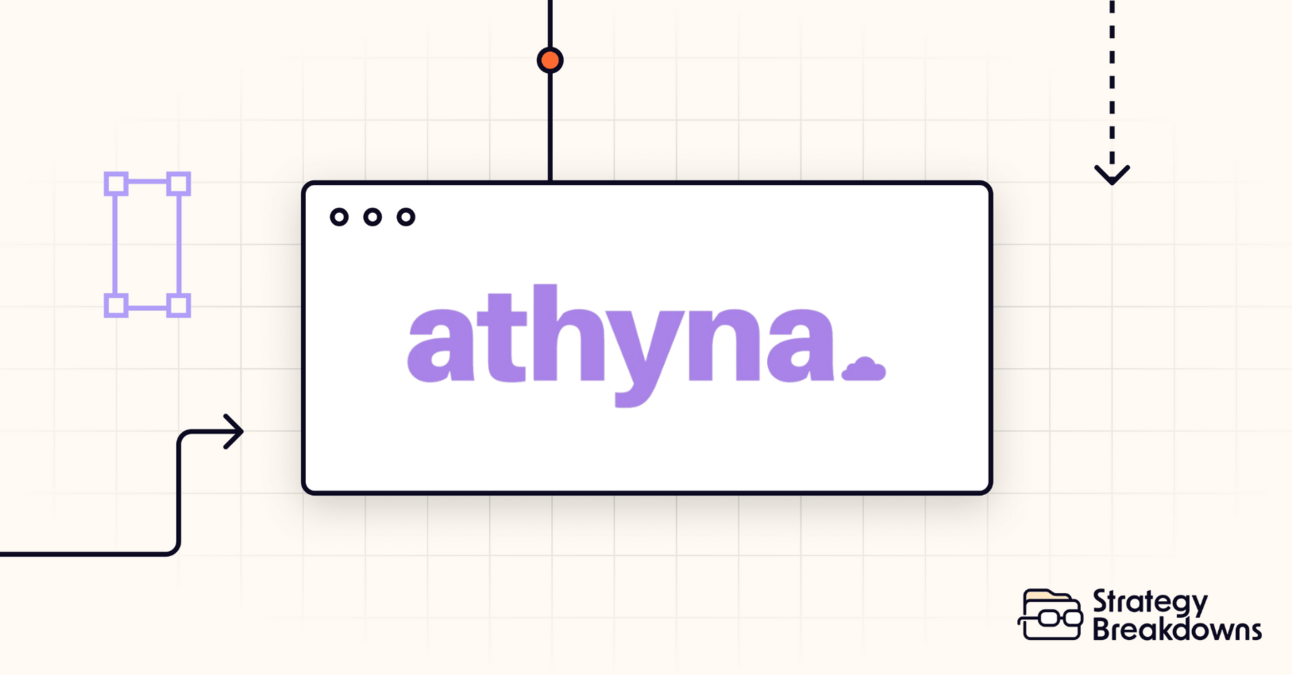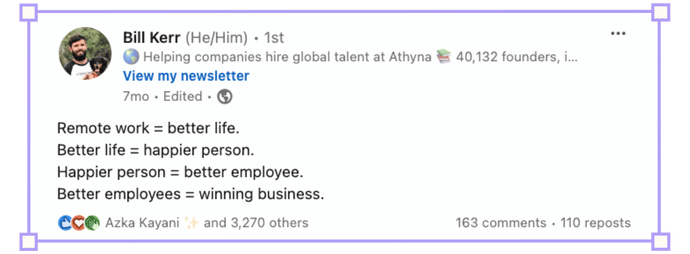
Read time: 12 minutes 33 seconds

I’m pumped for this, so let’s keep the intro short and sweet.
A few months ago, we published an article about a company I invested in: Athyna.
Part breakdown, part investment thesis.
In today’s DM interview, I got to go back and forth with founder and CEO Bill Kerr on one aspect of Athyna that I find absolutely fascinating: their culture.
I won’t let the appetiser spoil the main course, but to give a sense of why I begged Bill to share his philosophy on culture specifically - Athyna has the highest employee engagement metrics I’ve ever seen… and they are 100% remote.
Time to understand exactly how they do it.
— Tom
P.S. We made our first hire through Athyna, and the experience was so flawless that I invested in the company. If you’re looking to hire global talent, and want to benefit from a partner with culture at its core, click here.


Attio is the CRM for GTM teams who love products like Notion and Figma. It’s powerful, configurable, and takes no time to set up.
Attio delivers value faster than any other products out there - with one simple tactic during onboarding:
They sync your work email and calendar to automatically map out all interactions you’ve had with enriched insights.
And the outcome? In less than a minute you’re looking at a view of all your relationships over email - and it all gets enriched with additional data. It gives you time back to do more important work.
For free, you can join companies like ElevenLabs, Replicate, Modal and more to scale your startup to the next level.
Picture this: you have a great idea and you’re adding it to your product roadmap. What could possibly go wrong? It’s not like there’s a lack of alignment between your plans and what your boss’ boss wants you to build. Or that your roadmap is prioritised by the loudest voice in the room instead of evidence. Or that you’re constantly updating and persuading the rest of the business to get them on board.
A lot can go wrong when trying to bring a great idea to life, but with Jira Product Discovery, it's easier to prioritise, align, and connect teams to build the right thing.


💡
Strategy Playbook: Good culture is great strategy.


Breakdown
The how: The strategic playbook boiled down to a few DMs

Tom
Hola Bill 👋 I’ve been absolutely inhaling your newsletter Open Source CEO for the last few days, so I’m going straight for the secret formula:
Athyna's employee engagement scores for the last six months are 92 out of 100. 80 is considered excellent across the industry, and 100 is perfect.
Pls explain.
How have you managed this??

11:14 AM ✓

Bill
Howdy mate, excited to chat! 🏄♂️
Well, firstly let me start that by saying we probably don’t do anything that you are going to think; ‘Oh wow, that’s revolutionary.’ We do the simple things consistently and we do them well. Culture really is one of those things that is simple, not easy.
But if you do the right things, on a consistent basis, over and over and over again then doing the right things–which obviously is great for culture–becomes a habit. And it’s hard to break a habit right? Especially when everyone around you is still following it. Our corporate motto at Athyna is; “What would Ned Stark do?” Which effectively means, if there is ever a tricky situation and you can cheat, lie, do something sneaky you’d take a step back and think for a moment. For those non-Game of Thrones fans out there, the basic tenet, which is in brackets under our motto, is to do the right thing.

Source: Athyna’s wiki

11:19 AM ✓

Tom
Dharmesh from Hubspot is famous for this idea that culture is a product you build for your employees.
How do you think about product design, product lifecycle, iteration, experimentation, and other ‘PM-style’ disciplines when it comes to building a winning culture?
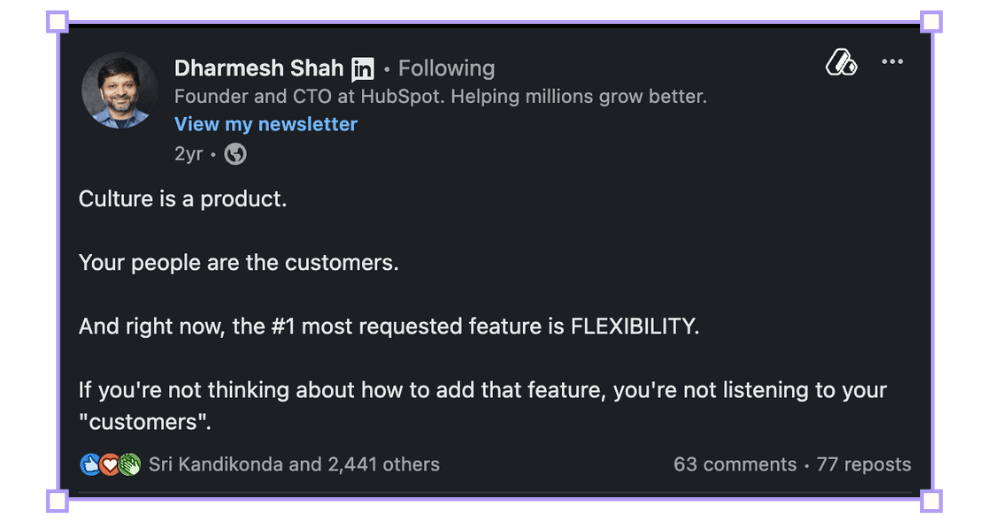

11:23 AM ✓

Bill
Yeah, that’s an interesting one–I have heard him say that as well and to me it sounds really nice but I am not sure how far that idea goes beyond a cool tweet. The best cultures are internal products but I am yet to hear of or see a company that tests like product does. So my short answer is all of those product frameworks don’t play into my psyche at all really. Culture is how you treat people, simple as that.
However, you do see some of the things you’d see in product in culture. For example; you should always be taking feedback and acting on it. So for example a few of our points of feedback look like:
Post onboarding survey.
Quarterly engagement scores.
Bi-annual manager effectives surveys.
Scheduled well check-ins.
Offboarding survey.

11:26 AM ✓

Bill
The idea of taking all these data points is to improve across the board. Lowest scores during onboarding was departmental documentation, cool, might be time to fix that.
The biggest and most impactful thing we do is our quarterly engagement surveys. The details we take from this, are synthesised and then an action plan is put in place for assessing some areas in which we scored the lowest. Again here, you might find some similarities to product in that you need to plan your resourcing, lay out timelines, keep stakeholders in mind etc.
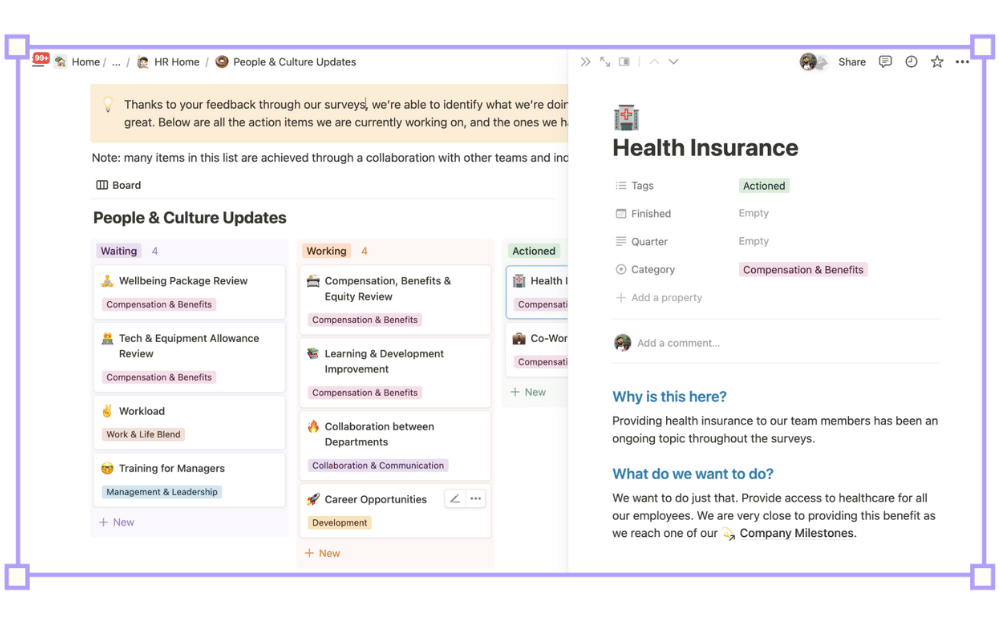
Source: Athyna’s wiki

11:31 AM ✓

Bill
A real world example from Athyna is in our last surveys we have scored lowest on people knowing where their career will take them next. Because of this, for the last months we have been building out a very robust career path philosophy that lines up across all departments.
We also have historically scored lower on how we decide on people's salaries. This is hard as a remote org because you have people from all over the world. We have worked really hard trying new and different ways to communicate and document our comp philosophy, and now that score usually floats somewhere in the middle, meaning it’s not perfect, but probably not the thing we need to dedicate the most time and energy to right now.

11:33 AM ✓

Tom
What's your overrated / underrated for culture?
(As in, what are the things that everyone says, which you think are pretty overrated, and what are some things that you think are not talked about enough, i.e. underrated?)

11:38 AM ✓

Bill
Overrated would definitely be office, offsites, and ‘serendipitous moments.’ I don’t think there is a link between office and culture. Maybe there is a link between vibes and being IRL, but if you believe, as I do, that culture is how you treat people; then where you lay your head at night has nothing to do with it. Usually, if I hear people talking about how important office culture, offsites and serendipity are I assume they are just shit at building culture.
You just have to look around at all the success stories today; Wiz for example, the fastest growing company in history–Google tried to buy them for $23B and they said no because they think they can be a trillion dollar company. Fully remote. And you know who was the fastest growing company in history before them? Deel. You know what they have in common? They are both fully remote.
Things that are underrated are the vibe avalanche, culture comms and lateral career movements. The vibe avalanche is a tactic we use when we welcome someone to the Athyna team. The moment someone signs with a new company is the moment they get ‘signers remorse’ and the nerves kick in. We try to squash that feeling by sharing any new hires the moment they sign in on our #welcoming channel in Slack.

11:42 AM ✓

Bill
We drop their email and LinkedIn and all of our team reaches out and welcomes them, telling how excited they are for them to join. It’s a wonderful little experience and something that has become a ritual of ours.
Culture comms goes back to what we were talking about earlier. Let’s take the example of career paths. For a while we knew we needed to build our career paths but we had other priorities. And then over time we noticed it was getting to be the lowest score in our surveys; aka the thing we need to work on next. Because every company is resource constrained in some way or another, one thing that will buy you a lot of goodwill with your team is being open and communicative with them. We talk about our survey scores and update them on what we will be working on. If it’s delayed, we let them know. If something is harder than we thought, we let them know that too.
People get it. We are all doing our best and we can’t do everything for everyone all at once. Making sure to be open though helps to remind everyone that we are doing our best and we hear them. Which goes a long way.
11:44 AM ✓

Bill
And lastly, lateral career moves are underrated also. It reminds me of in the British Office when Tim tells Dawn “It's better to be at the bottom of a ladder you want to climb than halfway up one you don't.” That is to say, promotions are great, but that’s not the only way to look after someone's career. How we think about this at Athyna is that we should always be checking people are climbing ‘the right ladder’ to go back to the Office analogy. The moment that someone suggests that they may indeed not be heading in the direction they want we switch into gear.
And when I say into gear, I mean there are two stages here. What I call ‘passive’ action and ‘active’ action. Passive is just checking in, keeping the conversation top of mind until it is either shelved or switched into the active stage. The active stage is when someone is really needing to move. I say ‘needing’ knowing that in most cases, you either are able to move the person internally or they will leave.
Switching things into active mode just means now we are all working together to get you on the path you want to be on. It may take 1 week, or it may take the best part of a year, but communicating that you hear them and you are working with them is key. One of the things I am most proud of is that we have a 100% success rate moving people into areas they want to be in.

11:45 AM ✓

Tom
What's the deal with employee engagement software? Do you have any thoughts on when they should be considered for a startup? Any products you really back?

11:49 AM ✓

Bill
When we were first assessing performance and engagement tools, I remember a rep from either Culture Amp or Lattice telling me that when you get to 25-30 people is when you should start looking at these tools. And me, as a culture bull, I agree with that. The tools aren’t cheap but culture is the only thing that can improve the baseline of every single thing you do.
If you were a bit of a people-second, culture bear you still probably need to look at it at the 50 people mark. We use Lattice by the way.

11:52 AM ✓

📝
Note: This email is about to get clipped.


Tom
Athyna is fully remote. Which hugely impacts culture. What are some things that are unique to a remote first culture that you actually can't get with 5d in the office?

12:01 PM ✓

Bill
My biggest ever post on LinkedIn really did a good job of summarising my thoughts on this. I think it went: remote work > better life, better life > happier person, happier person > better employee, better employee > winning business. To be honest, I believe that. Studies have shown across the board that people are generally happier working remotely. I am not here trying to fight the fight. I think it really is a philosophical thing now. And if you think your product will be better because there is some magic to in-person, then I wish you the best of luck.

12:06 PM ✓

Bill
I know that my philosophy is that I want the happiest people, and to your original question that comes with improved health and wellness, better sleep and more time with loved ones. That’s what remote work gives you in the office does not.

12:07 PM ✓

Tom
There's an obvious link between culture and hiring, and Athyna is a company with best-in-class culture, and actually offers hiring services. Curious if there’s some kind of flywheel / virtuous cycle there?

12:13 PM ✓

Bill
There is for sure some sort of a virtuous flywheel around brand, culture, employee brand, culture. What I mean by that is by having a great brand, you attract incredible people, and if you have a great culture those incredible people are motivated to do their best work.
This becomes super reinforcing over time. Your best people talk to their friends about how happy they are, and you have more great people kicking your door down to come and work with you. At Athyna we have team members that are ex-Amazon, Meta, Oracle, Uber and more. And a highly engaged team of A-players without the logos. We have over-indexed on brand and culture since day one at Athyna and it’s helped us build an incredible employer brand. That’s internally though of course.


12:20 PM ✓

Bill
Our employer brand shouldn’t really factor in too much when hiring a cloud engineer for a Series B startup out of San Fran for example, but it kinda does. Your employer brand is the online reputation of your organisation. We have never spent a dollar on talent marketing at Athyna and maybe that has something to do with it.

12:23 PM ✓

Tom
Is there a single point in time you can recall when you realised culture was going to be disproportionately important to you, lor form a big part of Athyna's priority / identity?

12:27 PM ✓

Bill
Yes, definitely. We hired a true head of culture at employee 6 and it took me a little while to realise that was weird. Carmela, our head of culture at the time, was a real leader leader. She’d talent Sendle through their Series A and B in Australia. I kinda assumed it was normal. Clearly, that’s not normal.

12:31 PM ✓

Tom
Strategy Breakdowns = strategy content for strategy nerds.
They'd kill me if I didn't ask: what actually is your ‘culture strategy’ (is that a term?)

12:35 PM ✓

Bill
I don’t have a ‘culture strategy.’ I’d love to have a more evocative answer, but culture really is the art of treating people well, nothing more. People seem to want to find ways to dress it up, like the Dharmesh quote, but it’s the sum total of a million little acts and decisions you make over time.

12:39 PM ✓

Tom
If you could give one culture ‘nugget’ to yourself 7 years ago when you started Athyna, what would it be? (ie 1 thing you know now that you wish you knew at the time)

12:43 PM ✓

Bill
I would have stuck to our ‘hub’ strategy. In the early days, our plan was to have an Australian team, an Argentinian team and a team based out of the Philippines. And to grow those three regions. It started off on track but after my co-founders left I couldn’t justify hiring anyone in Australia, or after we pivoted our market to the US, a team boots on the ground there.
And then we kinda slowly but surely weaned our way out of the Philippines. We’ve had lots of great Filipino team members and we still hire from that region from time to time for our employees but LATAM is just so much stronger of an ecosystem that we moved everything there.

12:47 PM ✓

Bill
The thing I’d change though is we started hiring totally remotely–one hire in this country, two in another–while the bulk were in Argentina. I think the best thing would have been / is to have strategic hubs which you build your team out of.
That way things like compensations and benefits, work norms etc. all become a lot more simple when you know an area deeply and really well. And then you also have the opportunity to build more IRL events if you so desire. I know I poo-poo’d IRL early but if you can have 10 people in a city and they can go work together twice a month and have a Christmas party, why would you not want that.
That’s how we have pivoted our strategy now. Back towards more hubs if and where we can. We already have a thriving Argentinian hub, and Brazil is getting larger now. We have a little Romanian hub we are incubating and we may end up with one or two more.
12:48 PM ✓

Tom
Let’s take a typical reader of Strategy Breakdowns: A Group Product Manager at a US SaaS with 3 direct reports, and your org has 25 people. What are 3 practical, actionable, high-leverage actions you can take today to have a disproportionately positive impact on your org’s culture? Of course, culture is a long-term game, but what is some low-hanging fruit?

12:53 PM ✓

Bill
Firstly, care about the person. Don’t make your 121’s about work and performance all the time, dedicate time to get to know what makes them tick. That’s the first. Build in some shoot the shit time inside of one of your monthly catch ups.
Second, care about their career and let them know it. You, as their manager, have the keys to the hopes and dreams. While you are overseeing them it’s your job to help them live their best life possible. They may not be able to reach their goals in their time with you but make sure that you really helped, not hindered them in that.
And finally, give praise like it’s going out of fashion. It doesn’t have to be shipping a life changing feature, or a 10k download milestone. It might be a crafty, fun way to gain a little bit of extra user insights, or maybe it’s the fact that your associate PM stayed up late with you one night tinkering with some stuff.
Work is hard, and there is nothing worse than feeling like all of your hard work is going unnoticed. So give face to face praise to the person directly, and then also scream it from the rooftops in meetings, Slack channels or other areas for all the world to see. It will go very far.
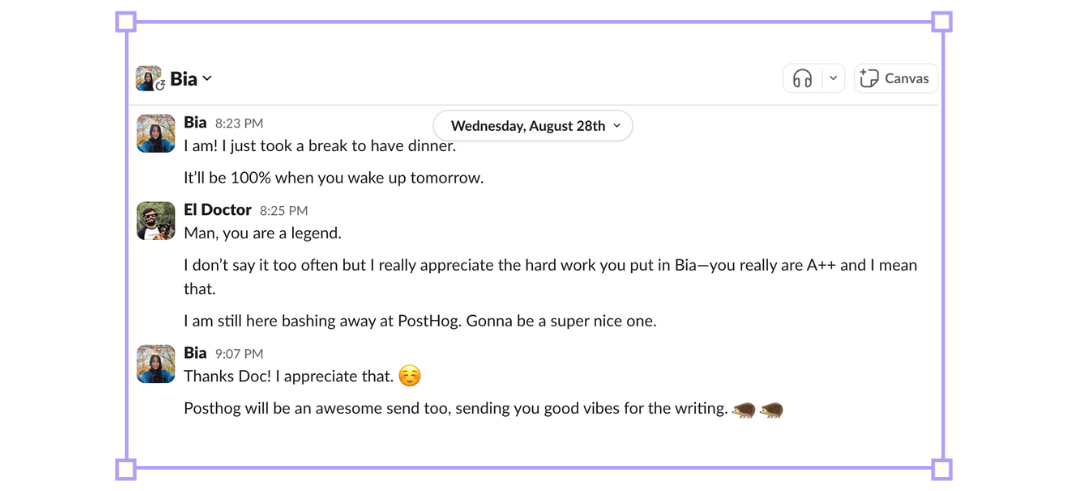

1:02 PM ✓

Bill
Pro tip: the more weight your title holds the most you might want to strategise your praise. Me being the CEO, I know my title casts a large shadow. To make sure everyone gets a pat on the back from me over time I built a database with every team member, how many times I have praised them and when I last did it.
This might sound like it’s anti-meritocratic, it’s not. It’s simply sharing the love. Sure, your top performers could get a great bit of praise every single day, but if you look hard enough, the financial intern might have done something pretty neat recently and it would mean the world to them to hear a piece of praise from the CEO.

1:04 PM ✓

Tom
Describe your philosophy about culture to a five-year-old, a new junior hire, an investor, and a distant family relative who forgot what you do for work.
1:07 PM ✓

Bill
Child: “Hey there Jimmy, your uncle Tom has told me you want to learn about what culture is. Well Jimmy, culture is how grown ups treat one another at work. If work is mean to a grown up, then the grown up might be mean to someone else. And that’s bad Jimmy, because it’s much better for everyone to be nice to each other, right?”
New hire: “Welcome James, I’d like to tell you a little bit about how we think of culture at Athyna. The most important thing to think about is that culture is very simple. Culture is how you treat people. We, as an organisation, will do our level best to treat you well, because if we do that, we know that in 99.9% of the cases you will do the same. This will reinforce our already great culture and make sure this place remains a great place to work for many years to come. Any questions?”

1:12 PM ✓

Bill
Investor: “So, JT the way we think about culture is simple: we try to treat people well. Simple as that. We know that if we do that, people will hear about it, and that therefore becomes our employer brand. Our culture is 93% out of 100 on average, with 80% being considered excellent. So I guess you could say, we undulate somewhere above the mid-way point between excellence and perfection. We do this because we know there is a direct correlation between engagement scores and stock price. Now, did you have your own pen or shall I grab mine for you?”
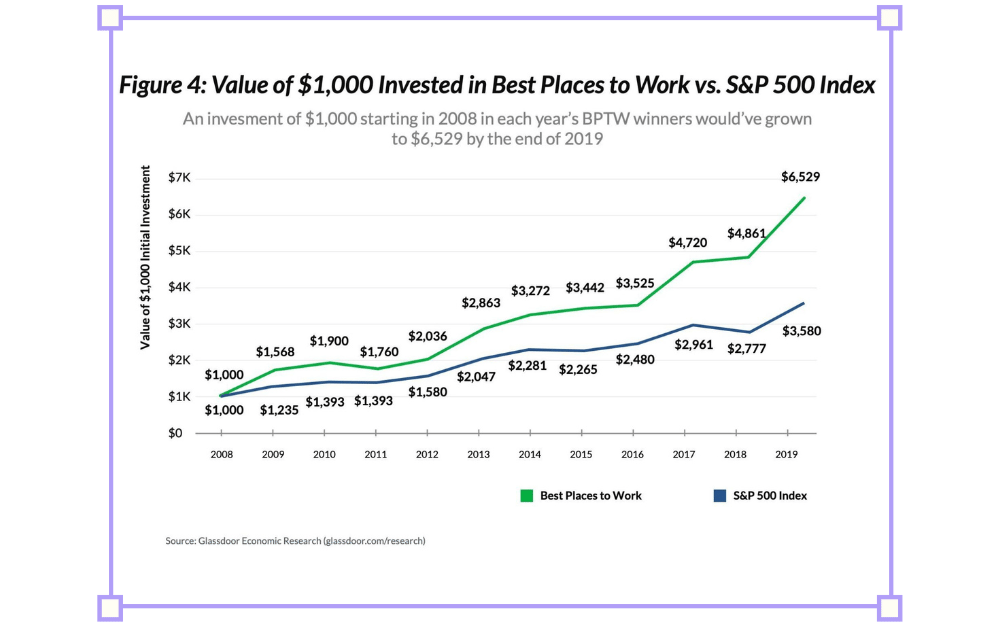
The stock price correlation.
Distant relative: “Hey there Uncle Jams, the way we think about culture is simple. Culture is how people treat one another at work. If we treat them badly, then they might treat someone else badly in turn. Nothing more than that really.”

1:14 PM ✓

Tom
What are your predictions for trends / changes in culture over the next 10 years?

1:17 PM ✓

Bill
I don’t think anything will really change. The lessons in Dale Carnegie’s How To Win Friends & Influence People remain just as true today as they were today when it was published in 1936. The tools may change, but what a good culture looks like today will be the same in another 100 years from today. And another 100 years after that.

1:20 PM ✓

Tom
Ok that’s about all I’ve got for you - this was an absolute goldmine. Thanks for indulging us!
brb gonna go re-read HTWFIP 📚
Before we call it, where can people find you?
1:21 PM ✓

Bill


Whenever you're ready, there are 3 ways we can help you:
Our flagship course on how to use free internet data to make better strategic decisions. Contains 5 years of strategy expertise, proven methods, and actionable tactics to accelerate your career with modern-day strategy skills.
We have a growing audience of 55,000+ strategists from top companies like Google, Meta, Atlassian, Stripe, and Netflix. Apply to feature your business in front of Strategy Breakdowns readers.
One of the most common questions we get asked is: “What tools do you use to run Strategy Breakdowns?” So, we’ve open-sourced our tech stack to give you an inside-look at exactly what tools we’re using to power each corner of this operation.


